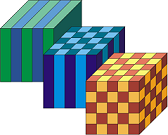Cubature
Contents
What is Cubature?
It is a numerical integration technique. From MathWorld, Ueberhuber (1997, p. 71) and Krommer and Ueberhuber (1998, pp. 49 and 155-165) use the word "quadrature" to mean numerical computation of a univariate integral, and "cubature" to mean numerical computation of a multiple integral.
Python wrapper for the Cubature package
From the Nanostructures and Computation Wiki at MIT, Steven W. Johnson has written a simple C package for adaptive multidimensional integration (cubature) of vector-valued functions over hypercubes and this is a Python wrapper for the referred C package.
Installation
To install in the site-packages directory and make it importable from
anywhere:
python setup.py install
If you are changing the _cubature.pyx file, you must have Cython
installed in order to create a new _cubature.c file. The setup.py
script will automatically try to use the Cython compiler first.
If you want to build only a local _cubature.pyd file, go to
./cubature and type:
python setup.py build_ext -i
Running the tests
The Python wrapper has been proven using test integrands from the C package and some additional testing functions from Genz. The integrands were implemented in Cython and verified with Mathematica.
After building cubature, run the unit tests with the `pytest` package in
the package directory. Be aware that this takes several minutes.
Examples
Some examples are given in ./examples.
Fork me!
You are welcome to fork this repository and modify it in whatever way you want. It will also be nice if you could send a pull request here in case you think your modifications is valuable for another person.
License
This wrapper follows the GNU-GPL license terms discribed in the C Package.
